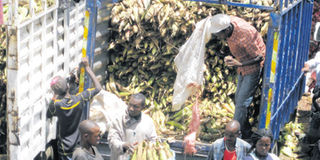Food prices rise fourfold as traders shy away from markets on poll fears

Flashback: Lorries supplying wares to Wakulima Market, Nairobi. Only 10 lorries were seen supplying foodstuff on Wednesday, whereas at least 200 lorries are normally crammed into the space in and around the market. Photo/FILE
What you need to know:
- On Monday, Kenyans voted to elect new leaders but delay in announcing the results, especialy the presidential tally, has caused anxiety and fear.
- Although the unusual price has been felt at kiosks and green grocers across the city, supermarkets reported that their prices had not changed and were unlikely to change due to the nature of their supply chain.
Prices of basic commodities have shot up, with the cost of some fruits and vegetables rising fourfold as traders and transporters stayed away from markets on fears that announcement of election results could trigger violence.
Sales at Nairobi’s Wakulima Market, which supplies the city and its environs with food, was sluggish Wednesday as traders showed up for the first time since Sunday March 3.
The normally vibrant market had only 10 lorries from the normal 200.
On Monday, Kenyans voted to elect new leaders but delay in announcing the results, especialy the presidential tally, has caused anxiety and fear.
According to the All Wakulima Traders’ Association chairman, Mr Cyrus Kariuki, traders were being cautious after the massive losses in 2007/2008.
During that election period, farmers continued to supply the market normally only for the produce to rot in the market for lack of customers.
“Farmers and traders are being very cautious as they await election results. This time round, they have stopped bringing vegetables while others are bringing smaller amounts,” said Mr Kariuki.
As a result, prices of fresh vegetables and other staples shot up dramatically. One cabbage, which before the elections cost Sh20, rose to Sh100 by the weekend, and is now selling for at least Sh60.
A 90 kg bag of potatoes is selling for Sh5,000, lower than the weekend’s Sh7,000 but still steep in comparison to the pre-election price of Sh3,000. Similar trends were reported in the prices of spinach and tomatoes.
Although the unusual price has been felt at kiosks and green grocers across the city, supermarkets reported that their prices had not changed and were unlikely to change due to the nature of their supply chain.
“There has been a supply chain hick-up. We are one day behind schedule but there is no shortage. Because we deal with specific suppliers and our contracts are long term, we will not be changing prices of our vegetables,” said Uchumi Supermarket chief executive Jonathan Ciano.
The supply chain hitches also hit regional traders. Wakulima Market usually receives truckloads of fruit from Uganda and onions from Tanzania. But the international traders’ segment of the market remained empty Wednesday.
“We have been advising our members to either keep their cargo at the port of Mombasa or in Uganda until the waters calm down in Kenya,” said Kampala City Traders’ Association chairman Everest Kayondo.
Regional economies came to a standstill the last time Kenya took to the polls, with fuel prices shooting up in Uganda while traders lost billions in damages to goods in transit.
Traders from Uganda are now demanding compensation of about Sh4 billion from the Kenyan government for these losses.




